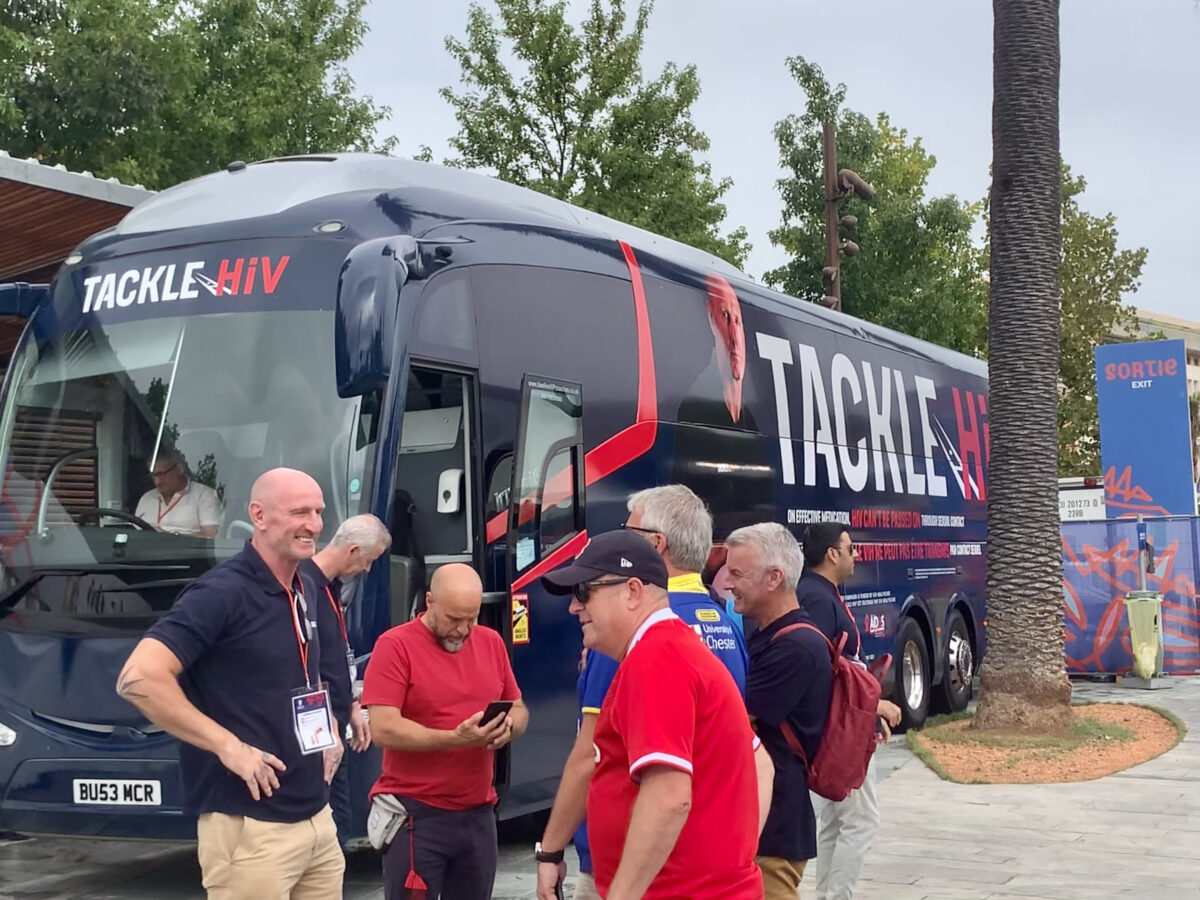### After Paris and Toulouse, the “Tackle HIV” bus stops at the rugby village in Nice, set up for the 2023 World Cup. Led by Gareth Thomas, former international rugby player, this initiative aims to raise awareness and educate the public about HIV.
The former Welsh rugby star was the first rugby player to come out in 2009. Ten years later, he revealed his HIV-positive status. In response to a survey with alarming numbers, showing that a third of people participating in contact sports did not want to play if an opponent was HIV-positive, he launched the “Tackle HIV” campaign in 2020. This campaign is in partnership with ViiV Healthcare and the charitable organization Terrence Higgins Trust. In France, the association Aides supports this project.
Aboard the “Tackle HIV” bus, Gareth Thomas travels the roads of France, stopping in the host cities of the Rugby World Cup. His goal: to combat the persistent prejudices about HIV by reaching out to an audience attached to the sports world, where the topic remains taboo. He is convinced that rugby and sports, in general, have “the power to drive positive social changes for individuals and communities.”
Forty years after the discovery of HIV, many myths continue to circulate, still causing discrimination and stigmatization for affected individuals. This leads, among other things, to “a setback in diagnosis and care access.” In France, 180,000 people are living with the virus, and 14% are unaware of their HIV status.
### Persistent Prejudices as Sources of Violence…
According to the Positive Perspectives survey for ViiV Healthcare, in France, more than 7 out of 10 HIV-positive individuals have faced a form of stigma related to their HIV status in the past 12 months. TikToker Supersero, with over 180,000 followers, was present to speak about the harassment he experiences and the death threats he receives daily, as he chose to speak out on his social networks. “Just last night, I received four calls at two in the morning telling me that I should be beheaded,” he reports.
“We have gone from a deadly disease to a chronic one, and even though scientific breakthroughs have been exceptional, mindsets have changed little,” laments Richard Chemla, deputy to the mayor of Nice for health. Nearly a third of 18-24-year-olds believe that HIV can be transmitted during protected sex, according to an Ifop study published in 2019.
Communications play a major role in the misunderstanding of this human immunodeficiency virus, according to the day’s speakers. Gareth Thomas fights to remind that “HIV can affect and does affect anyone, but it is still perceived as a virus that affects only gay or bisexual men.”
The former Welsh rugby captain wishes to clear up other misconceptions: “the only way to know your status is to get tested,” and “someone like me who follows effective treatment for HIV cannot transmit the virus through sexual contact.”
### …in the face of a lack of communication and education
“We are at a point where the subject is no longer in the media, even when there have never been more people living with HIV,” regrets Jean-Luc Romero, deputy to the mayor of Paris in charge of combating discrimination. The president of Local Elected Officials Against AIDS, himself gay and HIV-positive for 35 years, asserts that “visibility is important, visibility of homosexuality in sports is essential, but the visibility of HIV is certainly one of the crucial points today.”
“We have practically won the therapeutic battle, but we have lost, for now, the battle of communication,” confirms Dr. Richard Chemla. Gareth Thomas highlights the power the press can wield in this battle: “Maybe I will meet a hundred people a day in the bus, but when you use your pen or computer to write, you reach thousands or even millions of people. So when you write, you must highlight the facts, the truth, and when you write to commemorate, you must commemorate the science, the medicine.”
For Erwan Le Hô, vice president of the Core VIH PACA Est and president of the Zero AIDS Goal association, to combat the stigmas surrounding HIV, “we should start by enforcing the law.”
In France, the law requires at least three sessions of education and prevention around sexuality each year in schools, colleges, and high schools. Last March, the organizations SOS Homophobie, Sidaction, and Family Planning took the state to court to compel it to enforce the law.
### An Educational Bus
The bus stationed at the entrance of the fan zone allows the Tackle HIV team to educate and provide prevention over two days in Nice before heading to London. Inside, an immersive experience is offered.
Thanks to a virtual reality headset, each person can find themselves plunged into the daily life of an HIV-positive person. A daily life that can be filled with embarrassing situations, feelings of shame, stigmas, and anxieties, whether at work, in intimacy, or in society, as shown by the animation, before offering some advice.


